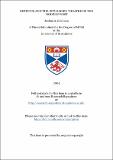Files in this item
Detritus and the ritualized theatre of the modern West
Item metadata
| dc.contributor.advisor | Hart, Trevor A. | |
| dc.contributor.advisor | Aguilar, Mario I. | |
| dc.contributor.author | Edelman, Joshua A. | |
| dc.coverage.spatial | 110 p. | en_US |
| dc.date.accessioned | 2018-06-26T13:00:32Z | |
| dc.date.available | 2018-06-26T13:00:32Z | |
| dc.date.issued | 2004 | |
| dc.identifier.uri | https://hdl.handle.net/10023/14610 | |
| dc.description.abstract | While theatrical performance is not an inherently religious act, the similarities between public, performed storytelling and religious ritual have been much noticed. Theologians talk about the Incarnation and the Christian life in performative terms, anthropologists have long used a theatrical metaphor to describe the workings of ritual, and modern theatricalists often use the language of ritual to explain theatrical potency. This dissertation surveys and critiques the ways these metaphors have been used in theology, anthropology, and theatrical studies, viewing theatre as an example of a meaningful cultural practice in the sense developed by Pierre Bourdieu and applied to ritual by Catherine Bell. It suggests problems in many common understandings of the ritual/theatrical overlap and proposes instead a particular strand of modern Western theatrical practice that has been subject to Bellian ritualization. This Ritualized Theatre of the Modern West is characterized above all by the presence of detritus: objects whose meaning and potency exceed the parameters established by their context and which are function and are recognized simultaneously as sacraments and as junk. This strand is explored with examples from the work of Samuel Beckett, Tony Kushner, and Glen Berger. In addition, this dissertation argues that the theatre provides a counterexample to Bell and Bourdieu's contention that a practice must necessarily misrecognize its actual effects. The Brechtian insistence that theatrical performance include an acknowledgement of its own conditions of production has led to the incorporation of a discourse about the theatre into theatrical practice itself. The Ritualized Theatre can thus provide a case study of what happens to a meaning-making practice when it ceases to misrecognize its own ends. | en_US |
| dc.language.iso | en | en_US |
| dc.publisher | University of St Andrews | |
| dc.subject.lcc | PN2039.E3 | |
| dc.subject.lcsh | Theater and society | en |
| dc.subject.lcsh | Rites and ceremonies | en |
| dc.subject.lcsh | Performing arts--Philosophy | en |
| dc.title | Detritus and the ritualized theatre of the modern West | en_US |
| dc.type | Thesis | en_US |
| dc.contributor.sponsor | Overseas Research Students Awards Scheme (ORSAS) | en_US |
| dc.type.qualificationlevel | Doctoral | en_US |
| dc.type.qualificationname | MPhil Master of Philosophy | en_US |
| dc.publisher.institution | The University of St Andrews | en_US |
This item appears in the following Collection(s)
Items in the St Andrews Research Repository are protected by copyright, with all rights reserved, unless otherwise indicated.

